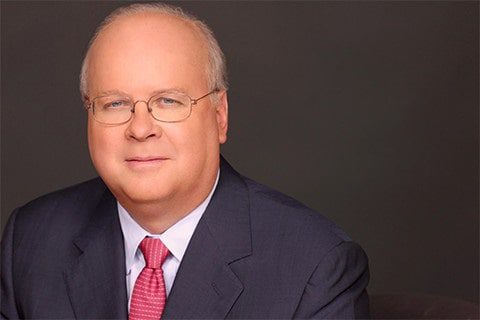You don’t need to be a Donald Trump fan to think the Colorado Supreme Court’s 4-3 decision to remove the former president from the state’s Republican primary ballot is a mistake that will strengthen him.

Opinion
By Karl Rove
The Colorado decision was based on the 14th Amendment’s Section 3, proposed by Congress in 1866 and ratified by the states in 1868. It reads: “No person shall be a Senator or Representative in Congress, or elector of President and Vice-President, or hold any office, civil or military, under the United States, or under any State, who, having previously taken an oath, as a member of Congress, or as an officer of the United States, or as a member of any State legislature, or as an executive or judicial officer of any State, to support the Constitution of the United States, shall have engaged in insurrection or rebellion against the same, or given aid or comfort to the enemies thereof.”
Mr. Trump is already using this attempt by the left to keep him off the ballot to raise money and whip up supporters. Admittedly, he would be a long shot in Colorado next fall, having lost the state by 13.5 points last time. But efforts are under way to kick him off the ballot in at least 15 other states and were attempted in 16 others.
Lawsuits to throw him off the ballot are on appeal in Arizona and Michigan and pending in 13 other states (Alaska, Nevada, New Jersey, New Mexico, New York, Oregon, South Carolina, Texas, Vermont, Virginia, West Virginia, Wisconsin and Wyoming).
Four states already dismissed challenges to Mr. Trump appearing on the ballot—Florida, Minnesota, New Hampshire and Rhode Island. Recognizing the weak hand they were playing, plaintiffs withdrew lawsuits in 12 others—California, Connecticut, Delaware, Idaho, Kansas, Maine, Massachusetts, Montana, North Carolina, Oklahoma, Pennsylvania and Utah.
The chances that the Supreme Court upholds the Colorado decision are slim. There are many legal problems with using the 14th Amendment in this way. For one, while Section 3 mentions “Senator or Representative,” it doesn’t mention “President.” Then there’s the little issue that Mr. Trump hasn’t been convicted of having “engaged in insurrection or rebellion.”
Section 3 was thought so onerous that a Republican Congress largely eviscerated it with the General Amnesty Act of 1872. President Ulysses Grant then directed U.S. attorneys to drop most prosecutions. The result was that in 1874 Democrats flipped the House for the first time in 16 years by electing 51 former Confederate soldiers or government officials. This included the Confederacy’s former vice president, Alexander Stephens of Georgia.
Consider this irony: In John F. Kennedy’s Pulitzer Prize-winning “Profiles in Courage,” one of the eight senators he chose as exemplars of political bravery was Lucius Q.C. Lamar of Mississippi, who in 1878 rejected a demand of his state Legislature that he vote for the Bland-Allison Silver Act. He survived having opposed the will of Mississippians by barnstorming the state to explain why he opposed an inflationary currency, winning re-election to the Senate “by an overwhelming majority” as “voters responded to the sincerity and courage which he had shown” in opposing the Legislature’s demand. Mr. Lamar went on to serve as interior secretary and a Supreme Court justice, appointed to both by President Grover Cleveland.
Yet as a congressman before the Civil War, Mr. Lamar proclaimed on the House floor that while “others may boast of their . . . love of this Union,” he felt “the promotion of Southern Interests is second in importance only to the preservation of Southern honor.” He drafted the Mississippi ordinance of secession, served in the Confederate military, was named the South’s ambassador to Russia, and served as a key aide to President Jefferson Davis. Historian Henry Adams called him one of “the worst of the Southern fire-eaters.”
Op-Ed by Mr. Rove, courtesy of rove.com, was first published in The Wall Street Journal.

Karl Rove served as Senior Advisor to President George W. Bush from 2000–2007 and Deputy Chief of Staff from 2004–2007. At the White House he oversaw the Offices of Strategic Initiatives, Political Affairs, Public Liaison, and Intergovernmental Affairs and was Deputy Chief of Staff for Policy, coordinating the White House policy-making process.
Mr. Rove has been described by respected author and columnist Michael Barone in U.S. News & World Report as “…unique…no Presidential appointee has ever had such a strong influence on politics and policy, and none is likely to do so again anytime soon.” Washington Post columnist David Broder has called Mr. Rove a master political strategist whose “game has always been long term…and he plays it with an intensity and attention to detail that few can match.” Fred Barnes, executive editor of The Weekly Standard, has called Mr. Rove “the greatest political mind of his generation and probably of any generation. He knows history, understands the moods of the public, and is a visionary on matters of public policy.”
Before Mr. Rove became known as “The Architect” of President Bush’s 2000 and 2004 campaigns, he was president of Karl Rove + Company, an Austin-based public affairs firm that worked for Republican candidates, non-partisan causes, and non-profit groups. His clients included over 75 Republican U.S. Senate, Congressional, and gubernatorial candidates in 24 states, as well as the Moderate Party of Sweden.

